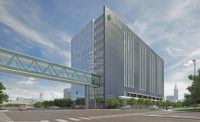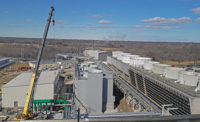The Midwest’s top contractors—many of whom had projects delayed or stalled due to the pandemic—reported $41.3 billion in revenue for 2020, a slight decrease from a record high of $42.5 billion in 2019. Revenue totals were reported by 85 contractors and construction managers from 11 states who responded to ENR Midwest’s Top Contractors survey.
Just as they have in the past, contractors took on a wide range of projects, including construction of a 200-bed veteran’s hospital in Chicago, expansion of a parking and rental car facility in St. Paul and construction of an innovation center and library at a college in Traverse City, Mich.
The contractors on this year’s list tackled projects in a wide range of specialties, including, but not limited to, environmental, transportation, education, aviation, manufacturing, health care and senior living.
|
Related Link |
In addition to their normal work, contractors also responded to clients’ unprecedented needs during the public health emergency by constructing temporary triage centers at hospitals and making face shields and other personal protective equipment.
Just as in 2019, the top spot was claimed by Chicago-based Clayco, which reported $3.8 billion in regional revenue for calendar year 2020. Clayco, as in 2019, was the only company to exceed $3 billion in revenue.
The next four spots went to Barton Malow with $1.79 billion, Ryan Cos. US, with $1.73 billion, Kiewit Corp., which reported $1.65 billion, and The Walsh Group, which reported $1.62 billion.
Chicago-based Pepper Construction Co., which came in 10th on the list, reported revenue of $1.2 billion, which was about the same as in 2019.
CEO Stan Pepper says 26 projects delayed their start dates due to the pandemic, but only five projects reduced their scope or faded away.
He credits the range of industries Pepper serves with contributing to its resiliency.
“We are a very diverse company, serving 16 markets,” he says. “Hospitality, retail, and commercial office and interiors were heavily impacted, while our health care, senior living, industrial distribution and solar saw increased activity.”
One of the company’s projects is Oracle’s Innovation Lab in Deerfield, Ill., which is designed to work off the grid; it incorporates 45.6 kW of photovoltaic panels with a SolarEdge inverter system and Tesla Powerwall for battery backup.
The structure provides an immersive experience demonstrating technologies in simulated construction environments. It is used to test new ideas and tools such as the Internet of Things and AI, with the intent of helping bring them to market, Pepper says.
Further down the list, in the 12th spot, Cincinnati-based Messer, reported $1.13 billion in revenue, a high for them.
“We achieved record revenue in fiscal year 2020, exceeding fiscal year 2019 business results, and we expect our 2021 revenue and income results to mirror 2020,” says Mark Leugering, chief operations officer.
While a worldwide pandemic was challenging and unpredictable, Leugering says the company worked fast to establish protocols for handling it.
“It took a lot of commitment and communication,” he says. “Internally, we activated our major incident response team, which continues to meet weekly to discuss the changing landscape of the Centers for Disease Control and Prevention (CDC), state and local requirements and how to best apply those rules across the multiple states where we work. We then provided updates via our intranet and site leadership.”
Like Pepper, he says serving a wide range of industries helped the company to succeed.
Industrial, federal/military and science and technology are growing sectors for the company and provided a pipeline of opportunities in such states as Indiana, Ohio, Kentucky, Tennessee and North Carolina.
Leugering says the company has been involved in construction projects at military installations in the Midwest for 80 years. It broke ground in November 2020 on an Industrial Production Complex at Wright-Patterson Air Force Base in Dayton, Ohio.
When occupied in 2025, the five-story building will include mission-specific functions, workspace for military and civilian employees and conference and meeting areas to support U.S. defense and cybersecurity efforts.
In the summer of 2020, Messer (in a joint venture with Harmon Construction) turned over the Lynn Family Stadium to the MLS Louisville City Football Club. The venue was completed two months ahead of schedule and features 11,600 seats, 18 luxury suites and specialized Bermuda grass turf.
While Messer saw revenue increase in 2020, Chicago-based Skender, 32nd on the list, reported $389.5 million in revenue, a 7% decline from 2019.
“The construction industry across the country was profoundly affected in the past year by compounding factors: the pandemic, economic turbulence, supply chain challenges and skyrocketing material costs,” says Justin Brown, CEO and president.
Brown says the recovery may not go in a straight line up, but he sees a return to construction activity.
“We’ve been encouraged by a significant increase in sales activity and have developed a strong, growing pipeline of new projects and an energized, connected team,” he says.
One of Skender’s most significant projects in 2020 was serving as interior office contractor for Bank of America’s 536,000-sq-ft new headquarters at 110 N. Wacker in Chicago.
Skender is continuing to address the pandemic’s impact on the supply chain and materials pricing and availability.
“We’re powering through by incorporating a variety of lean building strategies,” Brown says. “We’re collaborating earlier, expanding the menu of material options and procuring selected materials sooner, eliminating waste and rework as well as establishing comprehensive scenario plans and strategic budget reserves. All of this is helping our teams and projects stay on track.”
Tonn and Blank in Michigan City, Ind., (60th with $158.7 million in revenue) is owned by a hospital system and serves 14 hospitals. The other half of its work is in other sectors.
When local hospitals couldn’t purchase $100,000 medical care tents that were not available during the pandemic, Tonn & Blank built temporary triage facilities for the hospitals with materials it purchased at Menards.
“They are essentially pole barns with metal siding on the inside so they’re sanitary and very easy to clean,” says Jon Gilmore, CEO and president. They also made 1,000 face shields and 28,000 surgical gowns.
Gilmore says being prepared helped the company address pandemic-related challenges including potential delays in materials.
The company is building the Franciscan Health Orthopedic Center of Excellence in Carmel, Ind. In April 2020, the company purchased and stored all the materials it would need to keep the project moving forward.
“We procured everything ahead of time so we’d have it. We didn’t use just-in-time delivery,” says Gilmore, who adds that the project is currently on time and under budget.
Tonn & Blank has $500 million in work in the pipeline, and Gilmore says the future looks bright for the company, which meets the unexpected by planning and tapping into its experience and resources.
“You can’t plan enough,” he says. “And when things are in chaos, your management processes become even more essential.
“You need to be able to react,” he adds. “In the infamous words of Mike Tyson, ‘Everyone has a plan until you get punched in the face.’ That’s kind of what this pandemic was. You just had to hit it and react.”





